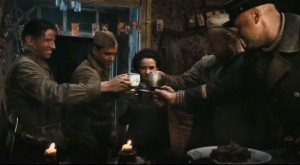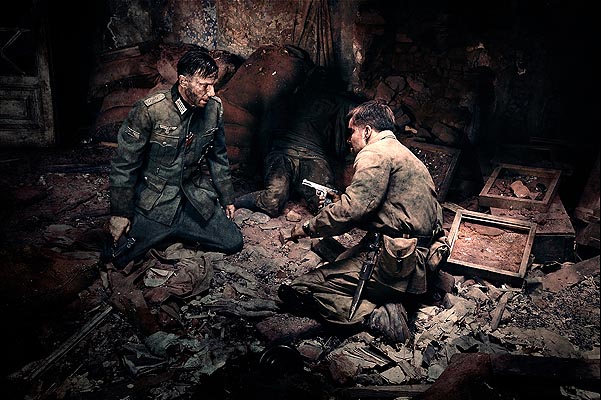You know the Russians actually defeated Germany in WWII, right? I mean, this shouldn’t be news. Americans gave a great deal of blood to keep Germany and Japan at bay in the 1940s, but not on the scale of the Soviet Union. Why do we discount Russia’s role in Nazi defeat? Many reasons, but three stick out: 1. We have feared and distrusted Russians for as long as anybody can remember, so it’s only natural to discount their accomplishments. 2. We don’t respect their military tactics, which tend to favor, “dig in, wait out the lethal winter, and win the war of attrition.” Russians have defeated many a powerful army with this cruel and unsportsmanlike strategy. 3. We don’t respect their government. I believe the argument goes something like, “if they don’t care about freedom, how can they possibly care who is their overlord …?” as if there’s only one good reason to fight for anything. Stalin was indeed as ugly to his own people as Hitler ever was or would have been to them, and yet Soviets fought to the bitter end to be repressed by their guy instead of the other.
We Americans like to say silly things like, “if it weren’t for us, you’d all be speaking German right now.” When you think about that statement in literal terms, it’s ridiculous. But if anybody gets to spout that absurdity, it’s not the United States. The battle of Stalingrad, for instance, claimed more lives than the entire American Civil War — and it’s not exactly close, either. The former outweighs the latter by at least a 2:1 ratio.
These paragraphs were not intended to slight any American; they are there simply to put into perspective our reality. We Americans paid dearly for freedom from Germany in World War II, as did all the allies, even Canada; the Russian sacrifice was, however, much greater and you can cite weather all you want, but they took out many, many, many more Germans in the process.
Now, speaking of Stalingrad, Russia made a movie. Oh yeah, I talk about movies, too. Stalingrad catalogs a micro look at the “bloodiest battle of all time.” Yes, they claim that in the film. And yes, they get to claim that. I looked it up. One could argue the battle for Leningrad was more devastating, but as that’s also same war/same country/same opponents, I’m not going to debate. Stalingrad is the highest grossing movie in the history of Russia; they didn’t claim that in the film.
It is November of 1942. The city is ruins, but the Soviets just won’t give it up. It’s a little spooky, in fact. Half buildings remain. Rubble is everywhere. Bodies are everywhere. There’s no food or running water or city services. Of course, it was pretty much like that even before the German Army got there :rimshot: Sorry. This battle sucked. A lot. But Russians are weird folk. The camera finds citizens collecting water from broken drain pipes and food by sifting the beach dirt mixed with the remainder of what once was a granary. The direction treats this as if nothing is wrong. And, in a way, there isn’t – to be Russian is to suffer. Don’t try to out-agonize those fuckers, you’ll lose. In a marvelous fight scene, the outarmed Soviet army pushes back a German line through a wall of fire. It’s a night assault, and the attacking Russians are literally on fire as they scream headfirst into Nazi gunfire. All this buys is one destroyed apartment building – an apartment building with Volga access. The Germans will need it to take the city. And it’s held by five men and young resident lady, Katya (Mariya Smolnikova), who won’t leave. Stalingrad is actually a war set about two sets of relationships – the five men and a lady and on the other side of the block, German Kapitan Kan (Thomas Kretschmann) taken with Russian hostage Masha (Yanina Studilina).
Truth be told, I didn’t care for either of these sets of relationships. In the first, the five men all act as both father, then lover, to Katya. This movie is told in a flashback during the aftermath of the Tohoku earthquake. A Russian EMT is trying to talk down a trapped German student with a tale about his “five fathers” at the battle of Stalingrad. I’m sorry, but WTF?! I expected at any time for the trapped lady to say, “oh, yeah, I know those guys – my grandfather totally butchered that section of town.” Yes, they are five fathers, but it’s pretty clear at least three of them have designs on Katya. Down the block, Masha doesn’t speak German, but after Kan rapes her, she comes around to the International language. The latter is the story with better character development, but Stockholm Syndrome really churns my stomach.
of them have designs on Katya. Down the block, Masha doesn’t speak German, but after Kan rapes her, she comes around to the International language. The latter is the story with better character development, but Stockholm Syndrome really churns my stomach.
I’m convinced “Stalingrad” is Russian for “City of Death.” God help anybody who ever set foot in that short-lived burg. I wouldn’t want to detract from the highest grossing Russian film of all time. The cinematography is fantastic. The battle scenes are quite good and there are a few “war sucks so let’s make the best of it” moments, like when the men celebrate Katya’s birthday. After all that, however, I found myself more and more fascinated with the comparative Russian attitude towards the Nazis – an American film would put the swastika front-and-center. Get that symbol of evil right out there for all to see. Stalingrad didn’t show one until 75 minutes in. Americans often portray Nazis as shrewd bigots, occasionally swayed by a stronger argument. Stalingrad showed mostly German impatience and contempt for all things Russian. The people were inferior; their lives are inferior; their army is inferior; drive them into the Volga now!
Moving a Russian by force
Is quite a feat, of course
You’d sooner try
A bat to cry
Or rat to fly
Or cat to sigh
Than uprooting a Slav on nigh
Rated R, 131 Minutes
D: Fedor Bondarchuk
W: Sergey Snezhkin, Ilya Tilkin
Genre: War, good God y’all!
Type of person most likely to enjoy this film: Anyone left alive who can actually claim having lived in Stalingrad.
Type of person least likely to enjoy this film: Nazis. Who else?



